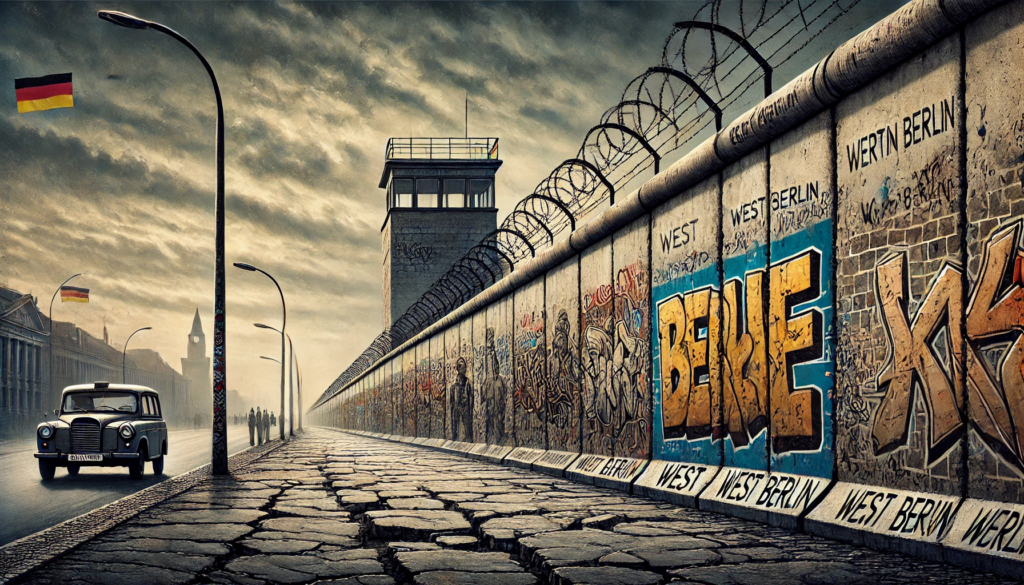
On November 9, 1989, a defining moment in world history unfolded—the fall of the Berlin Wall. This event marked not only the reunification of Germany but also the collapse of the Soviet Union’s grip on Eastern Europe. It symbolized the end of the Cold War and the triumph of democracy over authoritarianism. But what led to this historic moment, and how did it change the world?
The Construction of the Wall: A City Divided
Following the end of World War II in 1945, Germany was divided into four occupation zones controlled by the United States, the United Kingdom, France, and the Soviet Union. Berlin, located deep within Soviet-controlled East Germany, was also divided into East and West Berlin. While West Berlin became a thriving democracy, East Berlin fell under communist rule, experiencing economic hardships, political repression, and severe restrictions on personal freedoms.
By the late 1950s, millions of East Germans had fled to the West, seeking better opportunities. To stop the mass exodus, the East German government, with Soviet backing, constructed the Berlin Wall overnight on August 13, 1961. It stood as a concrete barrier stretching 96 miles, heavily fortified with guard towers, barbed wire, and a deadly “death strip” patrolled by armed soldiers.
The Height of the Cold War: Life Behind the Wall
For 28 years, the Berlin Wall was the ultimate symbol of division between the East and West. Families were separated, friendships were torn apart, and East Germans lived under strict surveillance from the Stasi, the secret police. Attempts to escape to the West were met with brutal force—more than 100 people were killed trying to cross the wall.
Meanwhile, West Berlin flourished under capitalist democracy, becoming a beacon of freedom and prosperity. The stark contrast between the two sides made the Berlin Wall a powerful representation of Cold War tensions.
The Winds of Change: The 1980s and the Rise of Reform
By the 1980s, the Soviet Union was facing an economic and political crisis. Mikhail Gorbachev, the Soviet leader, introduced policies of glasnost (openness) and perestroika (restructuring) to reform the stagnating communist system. These changes inspired pro-democracy movements across Eastern Europe, with citizens demanding greater freedoms.
Mass protests erupted in East Germany, Poland, Czechoslovakia, and Hungary, as people challenged their oppressive governments. The pressure on East German authorities grew unbearable, and by late 1989, it was clear that change was inevitable.
The Night the Wall Fell
On the evening of November 9, 1989, a miscommunication by East German officials led to an unexpected announcement that travel restrictions would be eased. Thousands of East Berliners rushed to border crossings, demanding to be let through. Overwhelmed and unprepared, the guards eventually opened the gates.
Scenes of joy and celebration spread as people climbed the wall, hammered it down piece by piece, and embraced their long-lost family and friends. The Cold War’s most infamous barrier had crumbled, signaling the end of decades of division.
The Aftermath: German Reunification and Global Impact
The fall of the Berlin Wall set the stage for German reunification, which was officially completed on October 3, 1990. It also marked the beginning of the end for the Soviet Union, which dissolved in 1991. The Cold War era had come to an end, and democracy triumphed across Eastern Europe.
Today, the Berlin Wall remains a powerful reminder of the resilience of freedom and the importance of unity. Fragments of the wall still stand as historical landmarks, ensuring that the world never forgets the price of division and the power of hope.
Hashtags:
#BerlinWall #ColdWar #History #FallOfTheWall #Germany #EastGermany #WestGermany #Reunification #Berlin #SovietUnion #Freedom #Democracy #Communism #Capitalism #MikhailGorbachev #USSR #1989 #BerlinWallFall #CheckpointCharlie #EuropeanHistory #GlobalEvents #HistoricalMoments #TearDownThisWall #Revolution #GDR #PoliticalHistory #GermanUnity #EndOfAnEra #ColdWarHistory #WorldHistory #FreedomPrevails